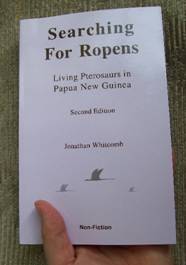|
Searching for Ropens |
|
Belief in Pterosaur Extinction
A textbook may declare the last living pterosaur died 65 million years ago, but a brief search of that textbook reveals nothing like objective reasoning for this oft-repeated obituary. Why? Look deeper: extinction of pterosaurs is not a proven fact: It’s an assumption. . . .
Is the non-extinction of this fish evidence that pterosaurs are still living? No, but the Coelacanth non-extinction can lend support to further investigations into sightings of what seem to be living pterosaurs: It lends cre-dence to the possibility. (The difference between lending credence and giving credence is akin to the difference between signing a 48-month loan for a car and finding car keys in a birthday package from Grandfather.) . . .
. . . Some of those human weaknesses are fear, pride, impatience, and lack of objectivity. Westerners, like villagers on a tropical island, are subject to sheltered superstitions. |
|
The General Theory of Evolution
Naturalism differs from natural science; it resembles an ancient Greek philosophy that all events occur without Divine miracles or intervention by any god. (Natural science is simply the study of the natural observable world, regard-less of origin.)
The idea that all living things have one common ancestor—this is portrayed as “science,” but it’s impossible to prove scientifically. (To prove it, would require continuous monitoring of all changes in all biological organisms from the earliest period of earth’s existence with life, to the present.)
Closing Observations
For imagining a creature that he assumes lived millions of years ago, a professor is labeled “knowledgeable;” for seeing a creature that professors assume died millions of years ago, an aborigine is labeled “ignorant.” The professor has no fossil that looks like his creature; the aborigine has no knowledge of the fossil that looks like his creature. Who is believed by professors? Who is endowed with practical knowledge? Let’s respect the eyewitness. |
|
Appendix: Quotations |
|
www.searchingforropens.com/appendix |
|
The appendix of Searching for Ropens includes an examination of superstitious-like assumptions called “sheltered superstitions.” |

|
Second Edition of the book Searching for Ropens |


